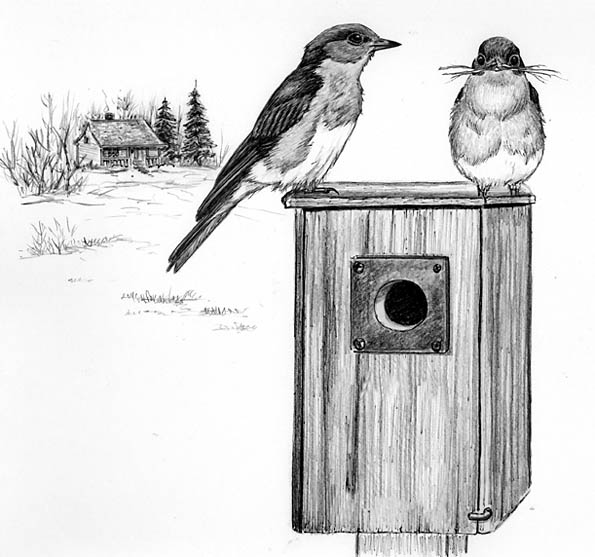
Dear Bird Folks,
For the past several days I’ve had a pair of bluebirds checking out the birdhouse on my deck. They are there every morning. Some mornings they even bring bits of grass into the birdhouse. However, not long after they arrive they disappear and I don’t see them again until the next morning. Where do they go for the rest of the day? Also, does the fact that they are putting grass into the box mean they are going to start laying eggs? If so, when?
– Tina, Harwich, MA
Oh, brother, Tina,
I used to be jealous when people told me about bluebirds coming to their yards, but now I’m just annoyed. I’ve lived in the same house for seventeen years and haven’t seen a bluebird within miles of the place. And you have them building a nest on your porch? Where’s the justice? What do you have that I don’t? Maybe people should be writing to you for advice, too. Hey, how about this: “Ask the Bird Folks, plus Tina”? Hmm. Maybe I should check with my agent, as soon as I get one. Bluebirds remind me of my friends who went to private schools. They are bright, well dressed and charming, but have few real life skills. Bluebirds nest in holes in trees but don’t have the ability to dig out their own cavities. They are totally dependant on woodpeckers to excavate homes for them or for some retired guy to build them a birdhouse. Because the birds have no participation in their cavity’s design, they must inspect several possibilities before deciding which location will fit the bill. There’s always a lot of checking and rechecking. Real estate agents hate it when they have bluebirds for clients.
The first pairs of bluebirds to go house hunting each spring are most often older birds. While younger birds are wasting time flirting, courting and texting each other love notes, the veterans are getting down to business. It’s the male’s job to stake out a territory and find possible nesting sites. Typically, he’ll land on the entrance hole of a cavity, shake his wings and call to his mate. More often than not the female just rolls her eyes and says, “You are kidding, right? Please tell me you are kidding.” You see, as with most couples, it is the female who has the final say on choosing a home. And with bluebirds at least, the female deserves the right to choose. Not only will she be spending much of her time inside the new home, but the success of her family and her own life depends upon her making the correct choice. Think about it. She will spend hours on end in a tiny room, and this tiny room will have no back door or any secondary way of escaping. If she chooses a site that is also attractive to the local predators, she could quickly go from being a mother to being lunch.
Sooner or later the female will find a location or two to put on her “maybe” list. She usually brings some grasses or other nesting material into each site to see how they “fit” her. The decision process may take as long as six weeks. In New England bluebirds often start house hunting in March, but they are in no hurry to finish the job. In case you haven’t noticed, the weather in March can go from pleasant to ugly to mega-ugly in a matter of hours and the birds know that. Laying eggs too early can lead to nest failures. But eventually, after many visits and a little price haggling, the female makes her choice and starts building her nest in earnest.
Once again it is the female who does most of the work. The male bluebird is more like eye candy. He looks great and may carry a bit of material for her, but he really doesn’t add much to the process, just like my friends who went to private schools. It usually takes about a week for the female to complete the nest. Most of the work takes place in the morning. The rest of the day the birds forage, preen and catch up on their afternoon soaps. Once the nest is completed she may lay her eggs right away or she may wait. As I mentioned above, if the weather isn’t right or if there doesn’t appear to be a readily available food supply, she could delay egg laying. Keep that last bit in mind. If the birds suddenly stop coming to the box, there is no reason to think they have abandon the nest, or have been eaten by a hawk, or have run off to join some weird cult. Be patient. There’s a good chance the birds will return and start raising a family.
What I find interesting about your bluebirds, Tina, is that they are using a birdhouse that’s on your porch. That’s not their typical nesting habitat. What I tell people is that bluebirds like open areas. Also, their houses should be mounted on poles to help discourage predators, and the poles should only be about six feet high to allow for easy cleaning. Perhaps I don’t know as much as I think I do. Maybe I’m like the male bluebirds – just eye candy. I can live with that.